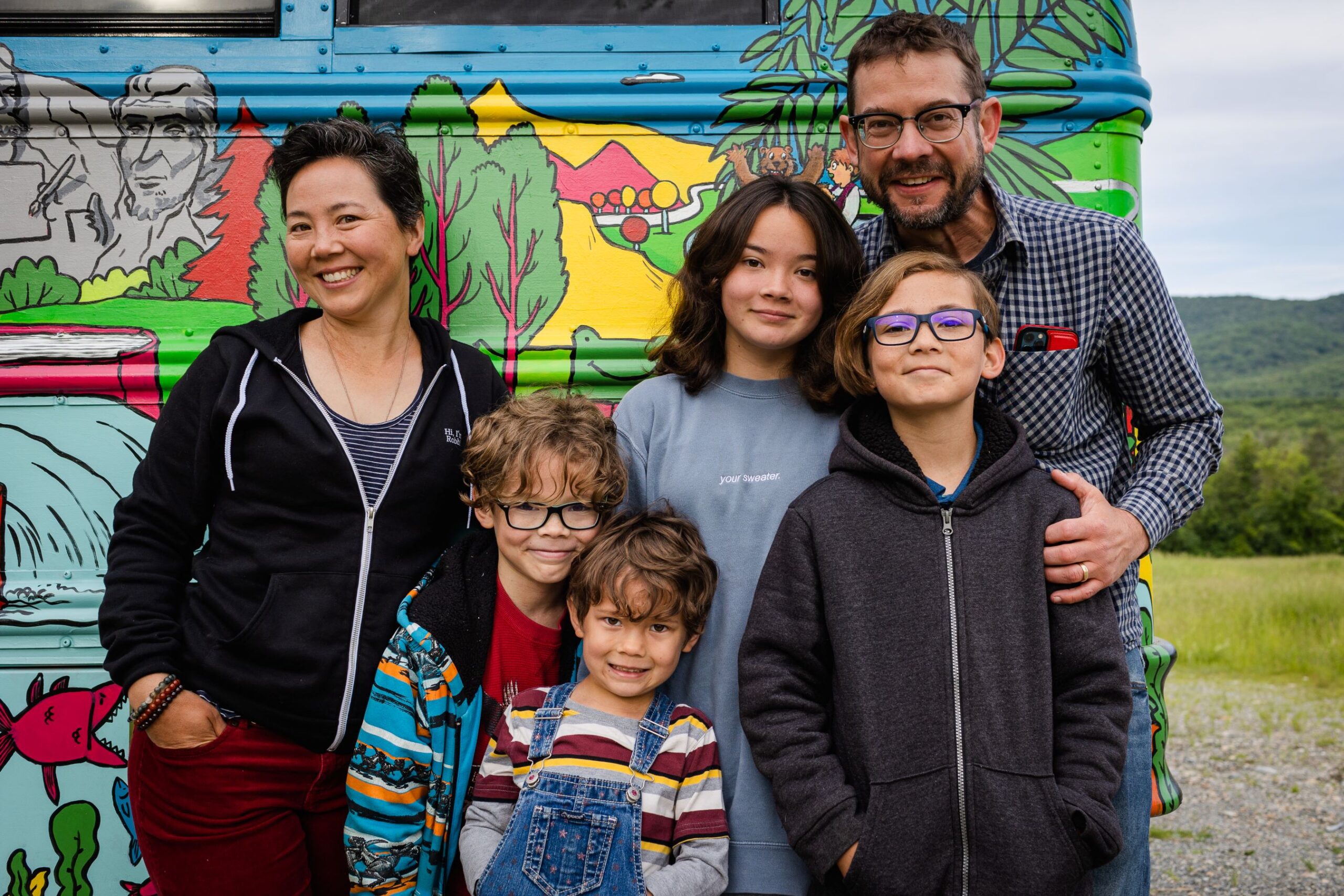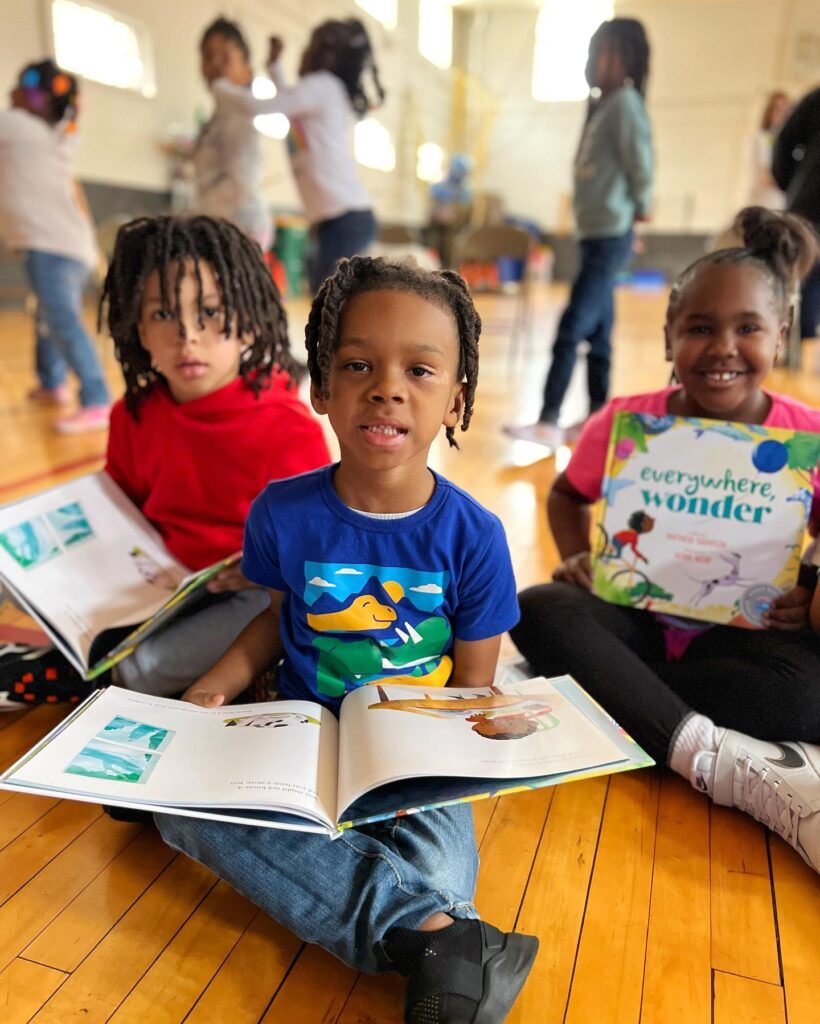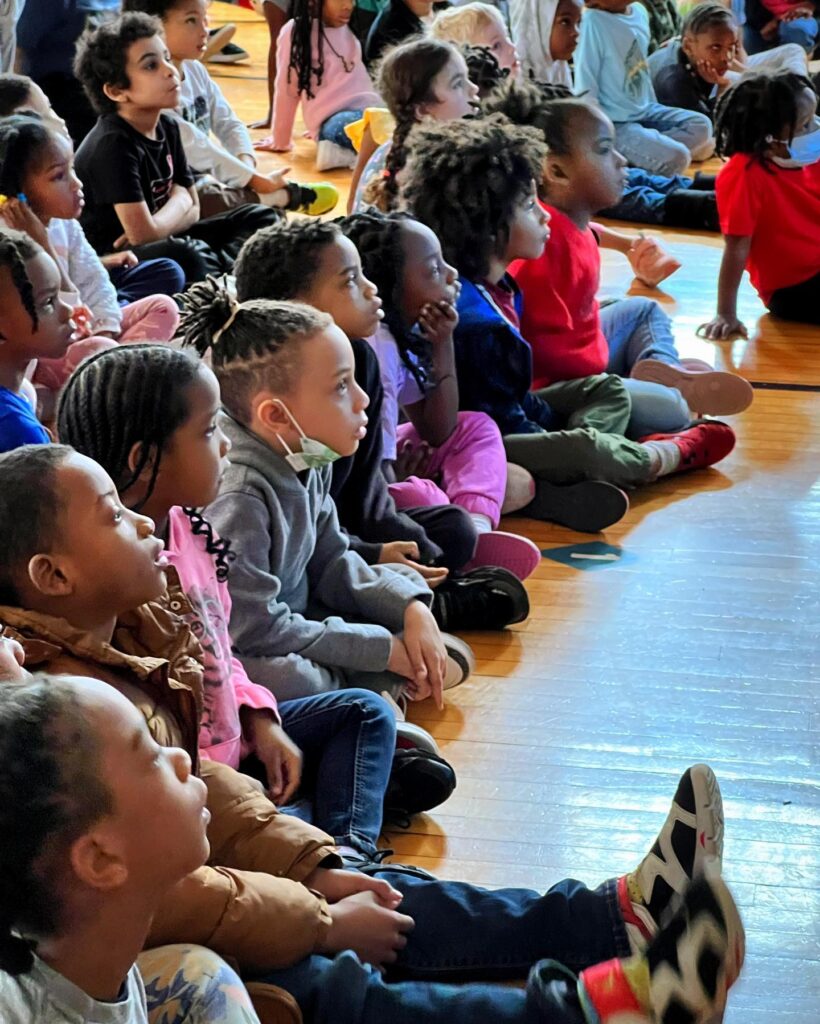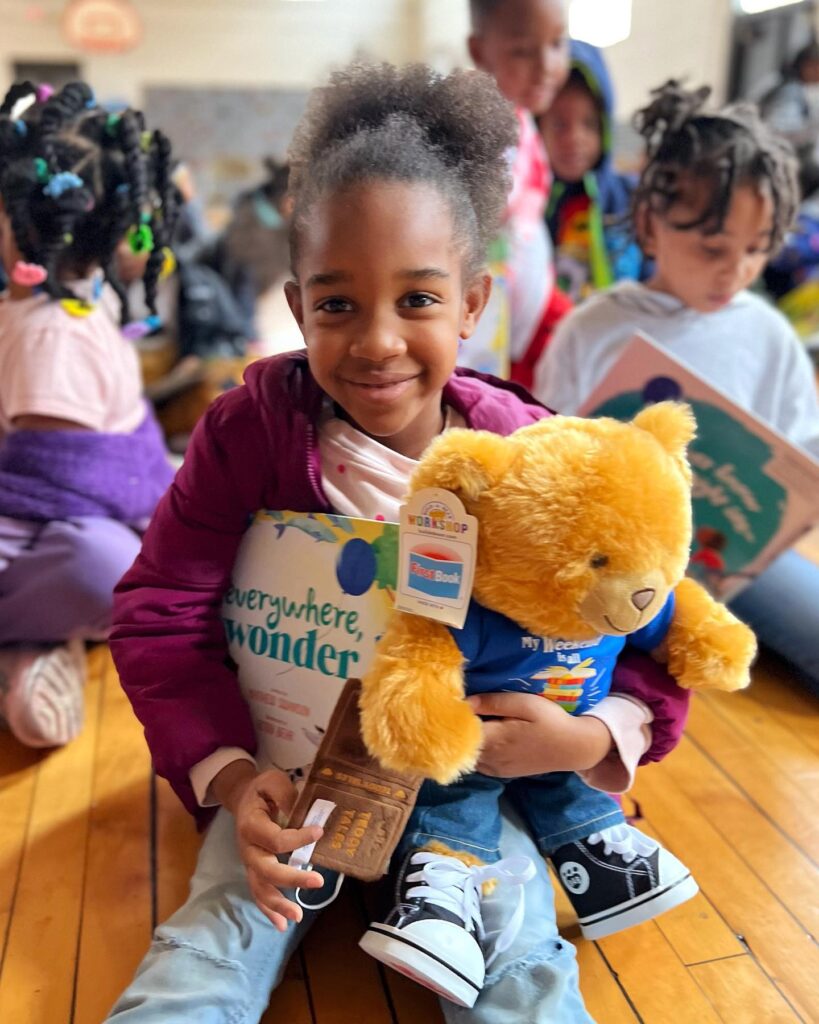
Robbi Behr (left) and Matthew Swanson (far right) with their children. Dumbles is hiding in the bus. (Photo by by Ashley Weeks Cart)
Last year, Matthew Swanson and Robbi Behr bought an old schoolbus and covered it with a handpainted mural, the kind so bright and fun that passersby have to stop to look.
Then they took off.
Two adults, four kids, and a dog living in this bus for a year, driving all over the country to visit Title I elementary schools in fifty states.
They had a galley kitchen and a pop-up bedroom on the roof—but no room for a toilet. That little scatological detail was what got me. Yeah, I loved their wry jokes and candor and blazingly successful literary partnership, with Swanson writing and Behr illustrating middle-grade and picture books. I loved the trip’s combination of nobility and whimsy, with its determined visits to Title I schools that support low-income families—and have scant library resources and with zero budget to bring in authors. But two adults, a six-year-old boy, a teenage girl, two lively boys in between, and no toilet?
They shrug it off. They spend every summer fishing for salmon in Alaska, and their cabin only has an outhouse. Campsites and gas stations are luxury by comparison. Besides, this trip has been a dream for a decade. It is about literacy, about creativity, about social justice. Contributions have poured in. First Book, a nonprofit in D.C., is storing and shipping books so that at each visit, every child receives a fresh, shiny new hardbound book instead of the worn, stained paperbacks they are usually given. Build-A-Bear has joined the partnership to celebrate its twenty-fifth anniversary, and is giving 125,000 additional books—and 125,000 “reading buddy” teddy bears—to Title I schools across the country. Surveys filled out by teachers and kids before, immediately after, and a month after each visit are streaming valuable data back to researchers at Washington College, where this trip is making possible the most ambitious research ever done about the impact of author visits on children’s literacy and creativity.
Six months in, the family dog, Dumbles, has been petted by, at rough estimate, twenty thousand kids. Teachers report that the minute the bus chugs away, the kids want to make their own storybooks. Daily posts, photos, and minute-long videos are chronicling not just a charming family adventure but the life of an entire country. One where there are plenty of free toilets but, in low-income neighborhoods, only one book for every three hundred kids.
They take time for a conversation en route:
JC: What reaches kids these days? [I mean in terms of book types and topics, but that is not how Swanson answers.]
MS: What reaches kids is the fact that we have made them feel like they have been chosen. Schools applied, and we selected one school from each state—a school not usually visited or appreciated. So the kids had the sense “Our school was chosen.” We make a customized video for each school before we come: “Hey, students of X, we can’t wait to meet you!” There’s this strange alchemy where the kids think that because they saw us on YouTube, we are famous, and it fills the building with such excitement. It’s all manufactured, but that doesn’t matter. And honestly, it doesn’t matter what book we show up with.
RB: I was thanking a kindergarten teacher for giving up her time to help the kids with the survey, and she said, “Oh my gosh, thank you! We are so excited. No one ever asks the kids anything.”
MS: Our most meaningful visits have been in the states most usually denigrated—Mississippi Alabama, Louisiana. Respect is what people have been responding to. Which is not what we expected.
JC: What made you select only Title I schools?
MS: Once we started publishing with Macmillan and Random House, we started getting invited to elementary schools, and they were all private or well-funded publics. We sent our kids to Title I schools, and we both attended Title I elementary schools. This is personal for us.
RB: We have been to many schools where there isn’t even a library up the street.
MS: If you don’t have books, if you don’t have a culture of reading, your path in life is going to be narrower.

JC: How did the two of you team up creatively?
RB: It wasn’t till we had been together for a couple years that we discovered that Matthew writes in a way that leaves a lot of room for illustration. He doesn’t do a lot of describing. He’d been writing short stories for adults that were very voicey, and the space he left was really fun to fill with illustration.
MS, laughing: It’s too much to even call them stories—they were nonlinear aphoristic musings. They were funny, but Robbi’s illustrations were the thing that gave them coherence and structure. We loved that marriage between language and image. So Robbi got her MFA in illustration and I applied for MFA programs in fiction and got rejected by every one of them. We quit our jobs and moved into an unfinished space above Robbi’s mom’s pottery studio. Before we “grew up,” we were going to spend one fun year, so we would never regret not making stories together.
JC: Yeah, and that was eighty-five books ago. You started out by self-publishing, printing the pages on your printer and hand-binding them and mailing them to subscribers….
RB: Our post office hated us.
MS: They put our pictures on the wall next to the felons.
JC: And now here you are, taking this amazing journey without a toilet.
MS: At campgrounds, there are bathrooms. Only once were they irritatingly far away.
RB: Says the man who.…
MS: That’s true. The world is my bathroom. Showers are the thing I miss.

JC: What else makes you cranky?
RB: Things not working. The roof leaked at the beginning. In a very rainy September.
MS: Hell hath no fury like a damp Robbi. For me, it’s usually proximity. Noise. I thought this trip would be unmitigated, unrelenting torture. But I very quickly surprised myself by sleeping well and being more patient than usual. The fact that so many people have made this trip possible has lifted my spirits.
RB: It’s hard to be cranky when you go into a building full of hundreds of people who are so happy to see you.
MS: And listening to the educators’ stories of the hardship their students face—violence, homelessness, being the primary caregiver for their siblings while their mother who works three jobs sleeps—feeling sorry for myself for being in a crowded bus would be impossible.
JC: How has this trip changed your kids?
MS: Our daughter is a ninth grader. Our original hope was to do this during eighth grade so she wouldn’t have to miss high school, but the pandemic delayed it. She’s giving up an important year in her life, and we are getting to intimately observe her as she is facing the questions and challenges of being fourteen. We can participate more directly and intimately in her life.
RB: There’s an amount of self-reflection for all the kids, being put in these situations. Our six-year-old goes into a new kindergarten and goes to school there for a day, and our seventh- and ninth-graders are sometimes invited in to answer questions. At a microphone, talking to hundreds of people.
MS: The powers of confidence and self-possession that must create—I can’t help but think that’s going to pay dividends later. And they will never be short of conversation at parties!
Are you homeschooling them along the way?
MS: Y-e-e-e-e-s, but not with a very robust plan. Alden has a math tutor. We are most concerned with her being prepared for high school, so she can jump right back in without skipping a beat. Our seventh grader is doing Kahn Academy math and science, too. The younger ones are reading and observing in addition to attending one day of school in every state.
RB: It turns out we are terrible teachers!
MS: The great challenge is fatigue. Every day is a completely new set of circumstances. The patterns of efficiency you get in a normal life are just not there.
JC: But you do have plenty of books. What does reading give a child?
RB: Empathy. If you’re browsing the internet, it’s voyeuristic; you’re not living as that person.
MS: A life lived entirely within your own mind is pretty narrow. Reading fires your imagination. Reading is a prompt; it’s not complete. You are meeting the author halfway.
JC: Your first writing was aimed at adults. Why switch to kids?
MS: I was so attracted to the space for innocence, before everything gets complicated. I keep trying to write YA and everything I write turns into middle grade. Maybe it’s what matches my sensibility, or maybe it’s where I think the most good can be done.
RB: One of the things there’s room for in kids’ books that there’s much less room for in adult books is wild imagination. For adults, you kind of have to justify everything. Kids just accept.
MS: That all sounded very smart and I think it might be true but honestly—
RB: You don’t like explaining things.
MS: —the reason I write middle-grade books is I find it deeply pleasurable. I don’t want to live in the world of facts. I want to live in the world of truths. The thing I’m glad I know that I didn’t know when I was a kid is that the rules and structure the world lays out for you are pretty arbitrary and don’t need to be followed. Most kids aren’t going to fundamentally reorder their universe the way we’ve gotten to do. Just knowing that it’s a possibility for someone to make books and travel the world helps them see that there are more possibilities for them, too. I want them to know that there’s uncharted wildness, there’s more possibility than we are led to believe.
RB: That was lovely. I like that. But I think what I would have said before you said all that is that I want them to know that they as an individual can and do make a difference. So many of these kids are constantly told or shown that they don’t matter.
MS: We want them to know that they are loved. Teachers say again and again, “They came, they talked about books, and they loved our kids.” We love these kids before we show up, we love them as fiercely as we can for a day, and we love them after we leave.

JC: You are handing out physical books. Is that a different reading experience than a digital book?
RB: I’m happy to read a digital book. But for these kids, it’s not about the convenience of digital reading. It’s a book as a gift. They’re used to worn, secondhand paperbacks, and when we give them a new, hardcover book, they know the difference.
MS: In North Carolina, the kindergarteners got their copy of Everywhere, Wonder. It’s a picture book with a brown-skinned kid on the cover. The little kids were coming in clutching their books, and one little boy held it up to his nose and said, “I like how this book smells.” And another boy said, “I like that I’m on the cover!”
Ultimately, this tour is about creating memorability. We don’t pretend anyone’s going to remember the lessons. It’s this audaciously colored schoolbus, and we are waving and giving high-fives and hugs. Then they come into our assembly, and we hug them as they come in, and they get to pet our dog. So there’s this wave after wave of things that are unusual, that are special, that hopefully create this pile of memories that last. We are trying not just to encourage them to read but to help them realize that creativity is not a mystical act; that they are storytellers too.
JC: How did you both become so free-spirited?
MS: I don’t think of myself as free spirited. I think of myself as uptight and controlling. Robbi’s mom grew up in Tokyo, moved across the sea for an adventure, met and married an entrepreneur, and they spent their summers salmon fishing on the Alaskan tundra….
RB: We are basically turning into my parents.
MS: If left to my own devices, I would be in middle management at a consulting firm. I was given access to the world of free spirit.
JC: What’s been the general public’s response to your trip?
RB: Absolutely positive. We haven’t had a single negative interaction with anyone.
MS: That is not true. We have had three. In six months.
RB: But nobody’s, like, yelled at us.
MS: The guy with the dog.
RB shrugs: He wanted me to be walking our dog without a leash.
MS: He was mansplaining. But we had braced ourselves for trolling, because these days, people can be negative about anything. In six months of aggressive social media posting, there’s not been a single negative comment.
JC: And how’s your dog handling the trip?
RB: Dumbles is a delightful traveler in the bus. He hates people.
MS: And dogs. He is such a puzzle. Our whole family is warm and friendly and outgoing, and Dumbles—
RB: He keeps it real.
Follow along with the family’s journey on Instagram, Facebook, YouTube, or the tour blog. Check out their website (or contribute) here.
Read more by Jeannette Cooperman here.
